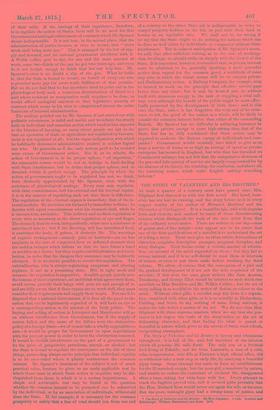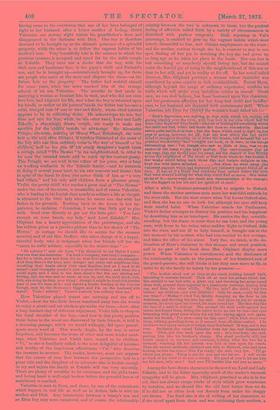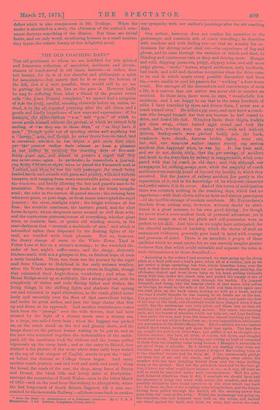THE STORY OF VALENTINE AND HIS BROTHER.* AT least a
quarter of a century must have passed since Mrs. Oliphant first charmed us with her first novel. Her hand, how- ever, has not lost its cunning, and the story before us is in every respect worthy of the author of Margaret Maitland and the Chronicles of Carlingford. It is a beautiful tale, told with singular force and vivacity, and marked by many of those discriminating touches which distinguish the work of the true artist from that of the ordinary novel-maker. There are writers in our day—men of genius and of fine insight—who appear not to be aware that one of the first qualifications of a novelist is to understand the art of telling a story. These men give us often subtle delineations of character, exquisite descriptive passages, pregnant thoughts, and witty dialogue. Their books excite a certain amount of admira- tion, on account of the mind expended on them ; but they fail to arouse interest, and it is no self-denial to read them at intervals of leisure, or even to put them aside before reaching the third volume. We allow, of course, that the conception of a plot and the gradual development of it are not the sole requisites of the novelist ; if this were the case, great writers like Jane Austen, Thackeray, and George Eliot would be inferior to such third-rate novelists as Miss Braddon and Mr. Wilkie Collins ; but the art of story-telling is as needful to the writer of fiction as colour to the artist. Without other gifts, a novelist may win from it a reputa- tion; combined with other gifts, as it is so notably in Richardson, Fielding, and Scott, to say nothing of some living authors, it makes the tale-writer a master of his art. We do not class Mrs. Oliphant with these supreme masters, when we say that she pos- sesses in her degree the craft of the story-teller, or the art of delineating character, and that feeling for what is grand or- beautiful in nature which gives to the novels of Scott such a fresh, invigorating atmosphere.
The Story of Valentine and his Brother is breezy and wholesome throughout ; it is full of life, and full therefore of the interest which all genuine life calls forth. The only son of a Scottish- lord living at Eskside, not far from Lasswade, a man of a cold, calm temperament, who fills at Florence a high official office, did nevertheless take a rash step in early life, by marrying a beautiful gipsy tramp. Some attempt was made to form an establishment for the ill-matched couple, but the poor girl, a wanderer by nature, and unable to endure the restraints of civilised life, disappeared after a time, taking her twin-boys with her. Every attempt to track the fugitive proved vain, and it seemed quite probable that the Hon. Richard Ross would never see again his wife GT his sons_ But the poor, untaught gipsy had a strong sense of justice, and * The Story of Valentine and hit Brother. By Mrs. Oliphant. 3 TOIS. London and Edinburgh: William Blackwood and Sons. 1876. having come to the conviction that one of her boys belonged of fight to her husband, after a bitter conflict of feeling, thrtist Valentine one stonily night Within his -grariafatber's door, and disappeared in the darkness With Dick. One boy is *therefore aestined to be brought bp as-the ultimate possessor of a splendid propertY; -while the ;other is to follow' the vagrant habits- of lila -mother's race. Very' beatitifirlly told is the manner in which the Precious treasure is accePted' arid cared for by the friable conple at Eskside. They have not 'a 'doubt that the -*boy, With 'his dark eyes and handsome face; is the gipsy's child and Richard's sera, and he is brought up—ostentatiously brought up, for there ire people who sneer at the story and diapute. the claim—as the future heir tO the' property. The father had resided abroad Ter some years; when the news reached him of the strange -advent of his son Valentine. The 'mistake he had'made in - marrying a *Conan so-beneathlikinTit'rank, -and' who did not even love him, hal- blighttid fds'frier,iind ivhenthelioY is' returned' Upon his handii;*or iat bmLIils pareirtilhaink, the father ITai'bcictiniera ttaff' 13frOne, ot whesie Chiefést
ise"of f n otiier
Fin'e readY'to Mike A.* r'6111
le,
it to'flYtitIg4 r WV1 hidettitis t‘ititikin trfAi'lFijvor lifinseiteitlies ,9 iniffm' 6e Oa tirliPtif yqinifk
allaiiimenipititotiiiithiAiewkikb-azi,
BIN difieiettiOnlilitafividdifio74atehLifrtin4:eurietirr whi5 tail; rfilyand he afttibeedi ong'iscri6t0'34itiiMaieloofilg OWn -remorse and Shaine; hitt frilpiii:of the harrialkdritti,tifirer think of him as." a very ad v11Taln"told hiS'viife"-Saitiveliddren form a pleasant gronp. Violet, the pretty chili-h.-Who resideia *great deal at "The Hewari" under the care of her nurse, is irresistible, and of edurse Valentine, who is leading in his boyish days nearly as -se/airy a life *Ss the gift, is attracted to the little lady whom be meeta' one day with her father in the-grounds. Rushing back to the house in hot patience, he exclaims, " Crandma, I want that little girl-to play with: *Send over directly to get me the little *girl !-- 'iron have enough on your bands; in? ladY," aid Lord Eirkside:"' Mr.
Oliphant has a hearty appreciation Of the picturesque, and she has seldom.gitren us a prettier picture than in her sketch of "The
Hewan" Cottage we should like to secure fin the Summer months) and of old Mrs. Moffatt, Who takes charge of it a happy,
cheerful body, 'who is :indignant when her friends tell' her She "maim be alifte Solitary, especially in the winter-time" :—
" Me solitary !" said old Jean, thankful to my Maker I noVer
-was one that was lanesome. l'm fond o'.contpany, real hind o' company but for a while, now and then; it's no that ilL-to have your *in thoughts. And then there's the hens, poor things! aye canty and neighbour-like, ...troubling their heads about their sma' families, just as I used to do myser—and Grampby yonder'e just.a great diversion ; and when We a .aauld night and- I shut to the door, there's the fire aye. stirring and birring, and the-wee nest as warn as,can :bei;and the auld clack, tick, tick, -aye doing-its dnty, poor thing ! then& it might be tired this blinder year or twa R's been at it ;' and there's a hantle reading in the Courant though, may be, the Scotsman's bigger, and I'm on the Leeberal side my-eel'. Toots ! solitaryl There's naebody less solitary than me."
How Valentine played truant one morning and ran off to Violet,—how the two little lovers wandered away into the woods to enjoy a picnic and eat chicken-pie under the trees,—how, after a long summer-day of delicious enjoyment, Violet falls to sleep on the loyal shoulder of the boy,—and how in this pretty position these babes in the wood are discovered by their friends, is told in a charming passage, which we would willingly, did space permit, quote every word of. This woody dingle, by the way, is never forgotten, and becomes the scene of other and more tender meet- ings, when Valentine and 'Violet have ceased to be children. "Vi," as she is familiarly called, is the most delightful of heroines and worthy of the impetuous, affectionate "Val," who deserves
-the treasure he secures. The reader, however, must not suppose that the course of true love between the prospective heir to a
great title and the daughter of an advocate who is foolish enough to try and injure the family at Eskside will run very smoothly. There are plenty of troubles to be overcome, and the girl's brave and loving heart is well-nigh broken before the peaceful haven of matrimony is reached.
Valentine is sent to Eton, and there, by one of the coincidents which happen in real life as well as in fiction, falls in with his mother and Dick. Any intercourse between a tramp's son and an Eton boy may seem unnatural, and of course the relationship
- existing between the two is unknown to them, but the gradual feelitigof affection called forth by a:variety of chttiritstatieeis 'is deseribetl' With Perfect congruity. ' DiCk, : rejoicing' in Nal's patronage, is enabled to give up the 'vagrant liabits"vrhieherti utterly distasteful to him, and obtains eniplOyment on the.tiver ;*- and the mother, restless though she be, is content to stay in one spot, finding all her joy, in watching the boy she had given up so long ago as he takes his place in the boats. Her one fear is lest something, or somebody should betray her, but she cannot resist the fearful joy of being in the neighbourhood of this son so dear to her still, and yet in rtality so far off. In her novel Called Innocent, Mrs. Oliphant portrays a woman 'wlbse, chaiLkeei was considered by some readers to lack verisiinilitna c' ForegNytkii
.,..... , ,i• . .
altbough'beyond the range of ordinary eXPeriTiee, ex1uitifts5J4 traits, which will strike even, fitstidious eritiailim iihrettl-ntielf care, we can Well -believe,' has been bestowd utaiiiilill'81aRaitegii 1 and her pasaionate affectiOn !Or'her long-lost' Child" nidibilifief2 ' kt. Oh'er husband are'delpre'tialith consummate ill;-:--vrnent Valentine left 'Eton -for alfddif?e'ivoinan'a heait f i,cf.ff,e-de.l i -,:.-7=,i7tqife.id.rf.i., f k;i4 fare„-Fr, 7r5,r: . ti. le,O- tll .k:TN1 fhvlitioiim IiAia' de 1elb2n-iW se rretlL ta 'i..." pick's dProK tht, ITiY zing 111:1pvrs riverviti hat eacia tereyes * icerA
some ti iifnherf d
Watt iheinitild " " iind,'Wl!MhtnolnisadwilerAacessof.raniarkatilik) Ahailland nwier:ordtsfinetSisitisltsSe ;,,,,h0iAlit 441141Y41.9111ffER1f13110igibt uNtgli eyes str:Esping,,IlAwverlta,ngtt that _onalhoap,..7htch she , nad nver faired to recognise ahoofing up or doAntliS titteam;,hailfterittiliei ei4 pre Seloii4Ondirfilllyluifftd oh OAP& Mit/tell, eV.' iti 'Jahn*, i to=ttatothInpai 4 uroeoistting bland V4 tLionglisheetsair Bctaitge 4: 1/52"1 w4glas.ift atisbor4 hog h9a#3to4RttoWa NAthqrrifai °..F1'?'"4f.ffial '41' til. .Ntainwo,t1t,alle,stkorIldhour his 'mpg sr, the snadow or 11111I 1 ting aarossIbewbmihtfibil of ifill'avelf,',or thlit igva'fthefOhe tli*irtiki vfailittlkilift btAklitiftraliTdfmalind .Sollornideltghts, fin hen kept ithi twilth liaddrt ialatiatikti: el; X 9.i 14TBA 'gr..464, : Aerl ICI*712TVI, 441.9 140.547/4:43NR/Ite.lkit fttiii eit fairaFiX.i'S%TejitY°4144, once.. was as if a an sad ea y n spread' dtttre tilitisys. gra' illWiritirloIll liofintlirt angel Atildi HMI not tefirel ,:13lieftei .4Polactaf. it,--neverreid4.naranade. any dsmonatiatar. of -.the litanget, bat she, flagged ,ip -her life. and -.12er.apitit. all at once- ,. . ;; Aft& rti while; Valentine-persuaded Dick: to migrate to T'Orfordi, and' there the mother assumes once, more her watchful attitucleaby thetiverLside. -But the time comes witeirVal leaves Oxford-also; and 'then she hasno one in look;:for;although her eyes .stillikeep their -wistful habit: -Wlient Valentine:-stands 'for Parliament, Violet's father attempts-to destroy -his-position and-his; happinest by deScribing him as arvinterloper.'- :Hstearries the day; notivith: standing; but the shame is more than he can bear, and the young Mani - With fever -in his t+eins,: takes sudden flight to-Oxforil,!falls into the river, and-too ill' to ,help himself, is bronghtmit at-the last moment by his mother,: Who hadhini carried to- her -cottage; and takes the Office' Offbis: nurse; Very fine, we think, is the de:- lineation 'of %Myra's- character , in this strange and sweet : position, and in no- part --of the book does Mrs. Oliphant' display more power. • When • Valentine-, is -convalescent, and the' disclosure of the relationshipis torale---in the presence of herhusbandanctof the grand=parents She still thinks it het' duty once More toiflin Order to do the family-no injury by her presente:— -.'
"The' inAlicir stied out aS king ii-she.COnld; holding herself hiok, labouring to restrain herself.- Then all- at 'woe her powers filledaihhi. She started-to her feet.:with...a 'guest :cry, And throwinglier arm,s..rquad them both,. pressed them together in a pasiiionate. ombraeo, kissing first one and then the other wildly. .' My two lads !' she cried; 'my two babies ! my children—my own children ! Only for once,—only for this one time!'—' Mother!' cried Val, faintly, dropping on the floor ln.....nis weakness, and drawing her into her:seat. And there he.lay.for another moment, his head upon her breast, his arms round her. Her face was like the face of a saint in ecstasy. She pressed his dark curls against her bosom and kissed them, lifting the heavy locks up one by one----her eyes brimming with great tears-which did not fall—saying again and again, under her breath, 'For once—only for this once !' while Dick stood_over them, sobbing, guarding them, as it seemed, from all ether contact. I do not know how many seconds of vulgar time thislasted.' It was,'and it was over. Suddenly she raised Valentine from her lap, and loosened his arms. 'Dick, put him back upon the sofa ;. he's overdone,' she said, putting, him into his brother's charge. She stood perfectly still, her hands clasped in nervous self-restraint, looking after the two for a moment, watching till her patient was laid at ease upon his couch. Then she turned suddenly, subdued and still, to Richard, who had been looking on like the rest—' Now I'm ready,' she, said, very low. 'I'll go where you please. There is one for you and one for me. I will never go back of my word to do you a wrong.' It's good of you to let me kiss my lad once, only once !: And now I'll trouble him and you no more.'"
Among the best-drawn characters in the novel are tord and 'Lady , . . , Eskside, and to the latter especially 'pinch of the reader's wannest sympathy will be given. Mrs. Oliphant, practised as she is in-her art, does not always escape tricks of style which grow wearisome by iteration, and we should like the old lord better than we do if he did not so often look out fiercely from under his shaggy eye-brows. Too fond also is she of writing of her characters as if she stood apart from them and was criticising their motives, a
defect which is also conspicuous in Mr. Trollope. When the reader is absorbed.in a story, the obtrusion of-the author's com- ments destroys something of the illusion. But these are trivial faults, and are only werth . mentioning because in a small measure they injure the artistic beauty of this delightful novel.




































 Previous page
Previous page